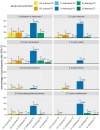Chronic pain management for older adults in ambulatory care : Results of a randomized pragmatic trial in Berlin, Germany
- PMID: 39994078
- PMCID: PMC11870945
- DOI: 10.1007/s00391-025-02429-1
Chronic pain management for older adults in ambulatory care : Results of a randomized pragmatic trial in Berlin, Germany
Abstract
Chronic pain is a major health challenge in older populations and approaches to improve ambulatory care are urgently needed. We conducted a pragmatic trial to test whether staff-directed interventions can improve chronic pain management in older community-dwelling adults and thereby improve their pain situation. Participants of 22 ambulatory nursing services (clusters) were allocated to 3 study arms: I1 (individual intervention with recommendations for each participant's physician and a newly trained pain nurse), I2 (digital training offered for participants' physicians and nursing staff) and CG (control group). Survey-based face to face interviews were held at the participants' homes. Descriptive statistics, ANOVA, and χ2-tests were utilized for data analysis. At baseline, 190 and at follow-up 144 participants were analyzed (24% dropout). Overall, the interventions were only implemented by a small proportion of involved staff. We found significant changes in documented nursing care in I1 but improvements regarding pain medication appropriateness or pain situations of participants could not be achieved. Structural challenges like time and staff shortages as well as the lack of billing options in ambulatory care were identified as major obstacles to substantially improve pain care. Policy makers need to enable appropriate compensation models for chronic pain care at home to enable aging in place for a growing population of older adults.
Chronischer Schmerz ist eine große gesundheitliche Herausforderung bei älteren Menschen, und Verbesserungsansätze in der ambulanten Pflege sind dringend erforderlich. Ein pragmatisches Studiendesign sollte testen, ob Komplexinterventionen die Schmerzversorgung und Schmerzsituation älterer Pflegebedürftiger verbessern können. Teilnehmende aus 22 Pflegediensten (Cluster) wurden in drei Studienarme aufgeteilt: I1 (individuelle Intervention mit Empfehlungen für Hausärzt:innen und eine neu ausgebildete Pain-Nurse), I2 (digitale Schulung für Pflegekräfte und Hausärzt:innen) und CG (Kontrollgruppe). Fragebogenbasierte Interviews wurden in der eigenen Häuslichkeit durchgeführt. Deskriptive Statistik, ANOVA und χ2-Tests wurden in der Datenanalyse eingesetzt. Zu T0 wurden 190 Teilnehmende analysiert, bei T1 noch 144 (Dropout-Rate: 24 %). Insgesamt wurde die Intervention nur von einem kleinen Teil des beteiligten Personals implementiert. Die Schmerzdokumentation wurde in I1 signifikant verbessert, Verbesserungen in der Angemessenheit der Schmerzmedikation oder der Schmerzsituation der Teilnehmenden konnten jedoch nicht erreicht werden. Strukturelle Herausforderungen wie Zeit- und Personalmangel sowie fehlende Abrechnungsmöglichkeiten für ambulante Schmerzversorgung wurden als wichtige Barrieren identifiziert. Entsprechende Abrechnungsmodelle müssen für ambulante Schmerzversorgung ermöglicht werden, um „aging in place“ in einer alternden Gesellschaft zu ermöglichen.
Keywords: Aging in place; Chronic pain; Nursing; Outpatient care; Pain therapy.
© 2025. The Author(s).
Conflict of interest statement
Declarations. Conflict of interest: D. Koios, A. Wenzel, R. Kuhnert, C. Rank, T.G. Riemer, M. Glawe, R. Kreutz und D. Dräger declare that they have no competing interests. . Ethical approval was obtained from the Ethics Committee of Charité—Universitätsmedizin Berlin (EA2/299/21), all participants (or their legally authorized representatives) gave written informed consent and the study was conducted in accordance with the Helsinki declaration.
Figures




References
-
- Blümel M, Spranger A, Achstetter K et al (2022) Germany: health system summary. https://iris.who.int/bitstream/handle/10665/366160/9789289059350-eng.pdf... - PubMed
-
- Charlson M, Szatrowski TP, Peterson J et al (1994) Validation of a combined comorbidity index. J Clin Epidemiol 47:1245–1251 - PubMed
-
- Deutsches Netzwerk Für Qualitätsentwicklung in Der Pflege (Dnqp) (2020) Expert standard on pain management in nursing. Hochschule Osnabrück
-
- Dräger D, Kreutz R, Wenzel A et al (2021) Older care receivers with chronic pain. Schmerz 35:322–332 - PubMed
-
- Folstein MF, Folstein SE, Mchugh PR (1975) “Mini-mental state”. A practical method for grading the cognitive state of patients for the clinician. J Psychiatr Res 12:189–198 - PubMed
Publication types
MeSH terms
LinkOut - more resources
Full Text Sources
Medical

